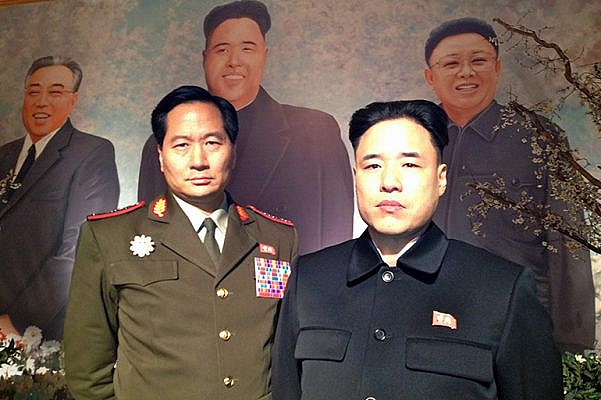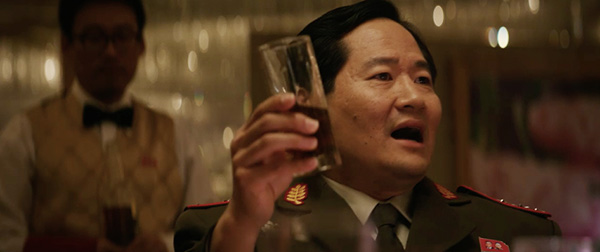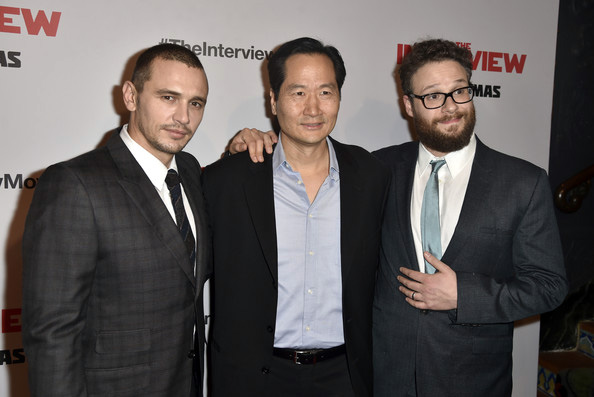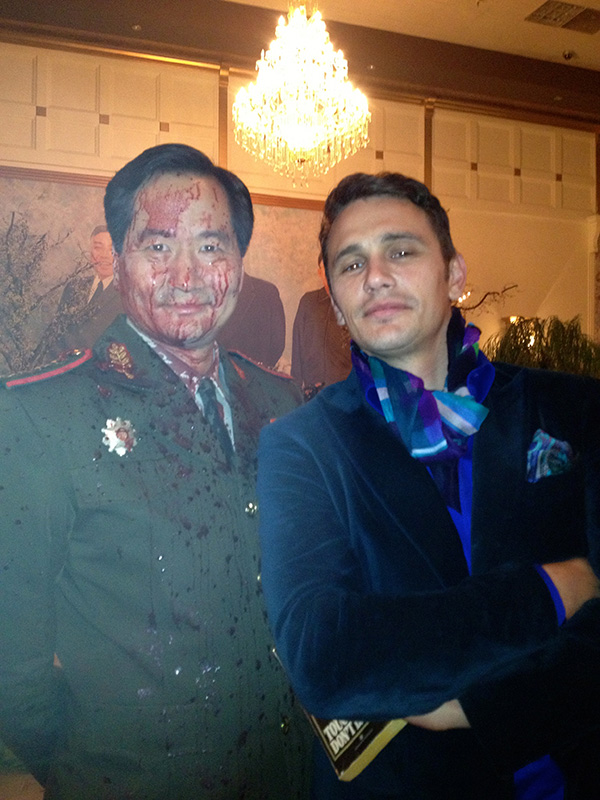
Charles Rahi Chun Dishes About Sony’s Contentious Interview
The actor discusses the film’s embattled release, what it was like growing up in South Korea, and the state of Hollywood’s diversity
As one of the go-to Korean-speaking actors in Hollywood, Charles Rahi Chun has the unique opportunity of owning Korean-centric roles, as well as pushing the limits of Hollywood’s diversity. In a career spanning more than two decades, the Asian-American actor has appeared in such projects as Dumb & Dumber, Everybody Loves Raymond, Scrubs, and Undercovers.
One of the actor’s most recent roles is showcased in Seth Rogen, Evan Goldberg, and Sony’s The Interview, which became embroiled in contention in recent weeks because of a series of aggressive hack attacks that compromised Sony Pictures’ computer systems and internal information. The attack rocked the entertainment industry, after tens of thousands of confidential documents were released, exposing less-than-favorable information about Hollywood’s major players, projects, and inner industry workings. The hackers have yet to be officially identified.
In The Interview, Chun plays General Jong, North Korean President Kim Jong-un’s right-hand man. While many actors from the film — and Sony, in particular — have remained tight-lipped with the media about November and December’s events, Chun agreed to share some of his thoughts. Dumpling spoke to the actor via phone and email to learn more about his experience working on the film, before, during, and after its controversial release.

Dumpling: How did you become involved with the film, and what attracted you to the project?
Chun: I gotta say, when I first got the script, I read it, and I was impressed at the research that Seth and Evan did in writing it, because they really did their homework, they researched it, they really understood the political situation, all the propaganda from North Korea and the history behind it. What I appreciated was, they make the Americans look like buffoons as much as they do the North Koreans. They kind of shed a light on how this tragedy could have occurred. And then, as an Asian-American, I particularly appreciated the fact that there’s a scene where something happens on the South Korean army base — so they really make a point to distinguish North Korea from South Korea — and then near the end of the film, when there’s U.S. military, there’s Asian-American U.S. military. So it’s not like some other films where the Asians are the bad guys, and you can’t tell, like: Hey, all the Asians are bad!
As far as how I got it, I’ve been doing this for about 23 years now, and I’ve had the fortune of playing North Koreans before. I was a guest lead in this J.J. Abrams short-lived TV series, called Undercovers, and I played a North Korean scientist who’s defecting. People kind of know me as that actor, they know I speak Korean, and they know that I’ve now played several North Koreans.
Given the access the public has to North Korea, it must be tough to research for those types of roles. Can you shed some light on that process?
It depends on the project. For The Interview, I saw General Jong as symbolizing the hardline generals. Because he’s symbolic of all the hardliners, there’s no shred of human sensitivity in the guy. So for The Interview, all I did was I watched every documentary, every YouTube news clip, of North Korea I could, to get a sense of who these North Korean generals are and how they function, and then base my character on that. But for something like Undercovers, where it shows a North Korean scientist whose heart is breaking because he couldn’t smuggle his daughter out of the country, I’ve got to really humanize the person, and I draw on my personal experiences for that. Because no matter where someone’s from, they’re human, and there’s a universal element that people can relate to and sympathize with.
This movie is a satire, but it still has some pretty dark elements. Was it at all tough to play your character?
It was pretty easy, because it’s a comedy and because we’re all improvising and trying to make the scenes as funny as possible — we weren’t shooting Schindler’s List. Everyone on set understood how dire the human rights situation is in North Korea, but the script is so funny, and the situations in the script are so funny that that kind of dire, heavy tone was not on the set. For me, when I got the script, I saw this as a great opportunity to shine a spotlight on the tragedy that has become North Korea. I thought, Oh, well this is cool; this film is really funny and maybe it will make people go and Google North Korea to understand the atrocities that are happening today. That awareness permeating in the culture can have some sort of effect. It might not be this year, but let’s say 10 years down the line, people who are working — whether it’s at government think tanks or businesses that might have some sort of agreement with North Korea — will think twice or understand what doing business with North Korea is supporting, as far as human-rights violations are concerned.
I think part of why I didn’t really consider doing it professionally early on was because when I was growing up there weren’t a lot of Asian-American actors on TV or in the movies.
North Korea has spoken out about the film a number of times. Do you think the country’s government was behind the hack attack that crippled Sony Pictures’ systems at the end of November?
Nobody knows, definitively; however, the evidence seems very strong, and the incentive seems really strong. All the specialists seem to be pointing their finger at North Korea.
When you were filming, were you told to prepare for any sort of response like that?
No, when we were shooting in Vancouver last year, there was no indication on set that anybody had any concerns about any kind of retaliation on this level. Clearly, I think everybody expected North Korea to not be happy with it, but frankly, this caught everyone by surprise.
The country’s initial response over the summer seemed kind of ominous, though. A government spokesperson said: “Making and releasing a movie on a plot to hurt our top-level leadership is the most blatant act of terrorism and war and will absolutely not be tolerated. … If the U.S. administration allows and defends the showing of the film, a merciless counter-measure will be taken.”
There was a threat of that nature, but we were done shooting in December. We wrapped a year ago. That first kind of serious threat came late. When I heard that, I thought, It’s a bunch of hot air. No one expected North Korea would retaliate in a war-like fashion over a movie. It didn’t cross people’s minds, so clearly it never crossed Sony’s mind that their servers could be hacked into.
Have you been affected at all by any of the hacks?
To my knowledge, I have not been affected.
How do you think the media is handling the hack fallout?
In a nutshell I believe this: I don’t think it’s right for media outlets to be allowing themselves to be used as the disseminators for the thieves who hacked into Sony. If it was North Korea, these websites that are sharing these hacked files are really being complicit with the North Koreans or whoever the Guardians of Peace are.
What would you rather see the media do?
The media has been focusing on the titillating gossip of what’s been released. North Koreans punish people when something bad is being spoken about them. If this was in North Korea, and you say something bad about the president, you’re thrown in a prison camp, or you get shot. I wish the media would focus on that. If (Amy) Pascal and (Scott) Rudin were talking about the North Korean president in this way, in North Korea, there would be a public execution. That’s how harsh it is over there. But I feel like the media is focusing on the information being released, which is to the benefit of the hackers, rather than focusing on the crime that’s been committed here. The focus should be on the perpetrators here, not the victim.

How do you think Sony has handled the scandal?
The leadership of Sony has to receive the credit they deserve, 1) for backing a film like this, 2) for sticking to their guns, and 3) for releasing it, despite all of what happened. If they backed down, the precedent it would’ve set — you know how the U.S. never negotiates with terrorists? The first time the U.S. negotiates, then the whole world will start kidnapping people because they know the U.S. will negotiate. You can’t back down in a situation like this, where it sets too dangerous a precedent for all the movie studios, for all of creativity.
What would you say to audience members who might be scared of going to movie theaters after the threats?
The important point in this is that audience members now have a choice to enjoy The Interview in movie theaters, when just days ago that choice was high-jacked from us with the use of fear. It was never a real threat in that there was never any proof, according to the U.S. Department of Homeland Security and other experts. I would encourage everyone to honor our free way of life and our freedom of choice and enjoy it fully without letting any unreal, imagined fears get in the way.
What would you say to filmmakers who might be wary of picking up other projects set in North Korea or based on stories involving North Korea? Steve Carell’s Pyongyang was just dropped by its distributor, for example.
I actually feel like now is a better time than ever to tell these stories about North Korea because there is such a heightened awareness of this totalitarian regime and its perceived threat. This incident really showed the passion and values of Americans and how we feel about having our freedom of choice and expression threatened in any way. How often do we see our President and the Republican National Committee — the far right and the far left and everyone in between — agree so passionately about something? This is unprecedented and should give creative and daring filmmakers inspiration to tell edgy stories. My sense is that Pyongyang and stories like it will be green-lit again and find broad audiences all over the world wanting to know more about what’s really going on there.
Do you still have a lot of family near that region?
I have extended family in South Korea. I’d say half of my aunts and uncles are in the States, and the other half are in South Korea. One of my uncles had two sisters in North Korea that he was able to rescue during the early years of the dictatorship. Had they stayed, their lives would have been hell. He wasn’t able to save all his siblings, so I think it’s the kind of thing where if you’re a Holocaust survivor, there’s a certain guilt that comes with it. Because even though you survived, you have loved ones that didn’t. It’s a very sensitive topic among South Koreans who may have family in the North, and there are a lot of families that were split up as a result of the Korean War.
What was it like growing up hearing stories like your uncle’s?
I was born in New York, but when I was five we moved back to Korea. My father was a professor, and eventually became a special adviser to the South Korean president. Because he had that position, our home was always guarded by military police, kind of like an embassy would be. As a kid, when I was 6 or 7 years old, I would play in these fox holes — that were real in case there was an attack from North Korea. I didn’t realize the reality of the threat because Seoul is only 30 miles south of the DMZ, the border separating the two countries. It’s shockingly close! I have a lot of memories from Korea. I also remember asking my dad once about North Korea, and as a kid I was always like, Why are they divided? It would be so great if they were united. I remember my dad said, “You know, in North Korea if you say something and they don’t like it, they could shoot you.” I never felt the ominous dark cloud of North Korea when I was there, but I was also a kid.
I think it’s a really great experiment to see the effect of freedom in a society. You’ve got South Korea that has freedom of enterprise, freedom of speech, all these kinds of things, and it thrives. Even in the States, people have Samsung phones, people drive Hyundai cars, people have LG TV’s – that’s all from South Korea. South Korea is a tiny country and yet it’s made this global impact. Contrast that with North Korea, since 1953, their media is all state-controlled. You cannot turn on a TV or go use the Internet without getting any bit of information that’s not government-approved, and they have this warped sense of the world. People are just dropping of starvation because there’s no economy to speak of.
How did you get into acting, and how did your dad’s political background inform your career trajectory?
Well, I had wanted to be an actor ever since I was a kid; it was always my dream. But my dad was a professor, and my mom was a registered nurse, and they immigrated to the States so they wanted safe, secure jobs for their kids. But I guess I was a creative spirit. I did a lot of theatre in junior high school, though it wasn’t until I got to college that I started choreographing and performing in dance concerts at Connecticut College. That lit the fire for performing. It was just a matter of me saying yes to my dream, really.

Do you remember when that moment was? Did something in particular happen?
After college I was working in New York City, doing public policy and community-organizing work. I founded a nonprofit for the Korean-American community, called CKAV (the Coalition for Korean-American Voters), and everybody in the community said the biggest thing our community needed was voter registration and education, and in the same breath they’d say, but this will never work because there are too many factions in the community for it to work. At the end of the day, the nonprofit was so successful that I just realized that anything in life is possible. That was one thing. And the other thing was I went to some dive-y bar in Greenwich Village in New York City, and there was a Cajun rock band playing called The Cowlicks, and they were just jamming. They were so immersed in their music that they didn’t realize an audience was there. I wanted to experience that.
How did your Korean background influence how your career began?
I grew up watching a lot of American TV, so my heroes were Starskyand Hutch and The Six Million Dollar Man. However, I think part of why I didn’t really consider doing it professionally early on was because when I was growing up there weren’t a lot of Asian-American actors on TV or in the movies. There’s a lot more now, but 30 or 40 years ago, there weren’t that many.
Was that a motivation or a demotivation?
The lack of Asian-American actors and images in the media growing up made the possibility of being an actor seem ridiculous. Even though I wanted to be an actor, I didn’t pursue it until after college, after having started a career in something more practical. But the great thing about drama school, for a student of any ethnicity, they will cast you in everything. In a Shakespearean production everybody’s going to play everything. So you play a whole range of roles, and you recognize that you’re acting talent is capable of playing all these roles. Coming out of drama school, I was actually kind of cocky and confident that I could be the one to help break some of these stereotypes. I had that attitude coming out and I would audition for everything. I think that was really good for me, even though I didn’t get most of them. It helped me understand that whatever agent and manager was representing me needed to think that way, whatever friends I had in the industry had to think that way. I surrounded myself with people who didn’t see barriers, and that helped me to not see barriers as well. A third of my roles in my 20s and 30s that I played on TV and in film were not meant for an Asian-American person.
Do you see that as an advantage now, or is there more that needs to happen in the way of equality in Hollywood?
In the 20 years that I’ve been doing this, I’ve seen amazing progress. We’ve got a ways to go, but I’ve seen progress. I’m encouraged that it’s continuing to evolve in a very open, creative direction. Big Hero 6 is a perfect example. And when I saw Up, I thought, Wow, this is great! The best part about it is the kid’s ethnicity was never a part of the story; it didn’t have to be. He just happened to be a kid who was Asian American. He’s just an American kid. Kids today don’t distinguish ethnicity as much as when I was a kid. They’ll go and see movies and not really think about ethnicity because it’s less of a factor in their lives.
This interview has been condensed and edited for clarity.
Photos: Courtesy of ZTPR and Sony Pictures.
Tags: Charles Rahi Chun, hacking, James Franco, Seth Rogen, Sony, The Interview
